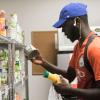Colbert Farm Little Flock Raises Local, Organic Poultry
The Locavore
In early November, the World Health Organization officially called on farmers worldwide to stop giving so many antibiotics to food animals. Pigs, chickens and cattle have been given antibiotics since the 1950s to help them gain weight faster, but the growing concern over drug-resistant infections has forced governments and food industries to rethink their use, and galvanized consumers to demand a different kind of meat.
Over 25 fast-food chains have sworn off antibiotics in their chicken, and many Athens spots opt for an antibiotic-free bird. Home cooks can find organic options from major producers like Tyson, Perdue and Georgia’s own Springer Mountain Farms at supermarkets, but locally raised poultry has been harder to find.
Little Flock in Colbert may have you covered. Opened in 2014, Little Flock is one of three farms that make up Community Meat Co., a co-op serving local meats to about 60 families in the area. Meg and Gus Darnell own both Little Flock and Community Meat Co.
Meg Darnell says she and her husband met working at the now-closed Athens restaurant Farm 255, where they were both first introduced to small-scale, locally raised meat. “We got to explore what was seemingly burgeoning at the time, this new type of meat from the old times, before the industrialization of meat,” she says.
As their interest in growing food progressed, they left the restaurant to do a nine-month apprenticeship at a livestock farm in Indiana in 2014. “Being in the position of selling at farmers markets, handing families this well-produced, nourishing food that we helped grow sort of solidified our passion,” says Darnell.
The Darnells returned to Athens with the idea to create something to support local meat producers. “There was so much going on with vegetables, but it seemed like there was a gap in the meat arena,” Meg Darnell says.
Thus, Community Meat Co. was hatched. Though the co-op has been around for almost three years, Darnell isn’t surprised if you haven’t heard of them. Since opening, the business has been sustained mostly by word of mouth and the couple’s personal network.
“We’re providing the upper echelon of product as far as keeping it hyperlocal,” she says. “We’re for the ‘know your farmer’ crowd who want to keep dollars in the local economy.”
And, says Darnell, their dedication to using techniques that are healthy for the animals and the land make this type of farming unique. “Land stewardship is a big part of what we do, and it can get lost pretty easily, even in organic circles,” she says.
The Darnells chose to raise a French breed of chicken that hasn’t lost its instinct to forage in open fields. Their birds rotate around 16 acres of pasture land, a few yards each day, which not only keeps their grazing supply fresh, but also distributes their waste. “It’s really amazing to see what we call the fertility streak, where we march them across the pasture over 10 weeks, and you can see this green strip that follows,” Meg Darnell says.
More so than the meat itself, poor waste management on industrial farms is how people are being exposed to antibiotics used on livestock. Farm runoff contaminates the surrounding water supply with drugs, and multiple studies have shown that this is one way drug-resistant bacteria make it to our tables.
New FDA regulations that went into effect this year prohibit the use of medically important antibiotics as growth promoters, but experts have expressed doubt that these regulations are doing much to curb use.
Darnell studied nutrition in college and is tuned into the connection between soil health and human health. “It’s cool to me to be on the farming side and know the nutrition side, because they mirror each other,” she says. “It’s very important to us to be a place that can provide a product to people that they don’t need to be concerned about.”
First-rate meat, however, comes at a cost. Pasture-raised chicken (or pork or beef) is expensive, but Darnell points out that it’s not because farmers are trying to gouge consumers. The cost of land, organic feed and waiting a little longer to slaughter makes for tight margins. “That high price tag is what it should cost,” she says. “Being sustainable as a business is a delicate balance without compromising our values.”
The trade-off is worth it, she says, to offer a product she and Gus can be proud of.













comments